… continued from part one
Our approach to Perquín was so slow, as you’ll recall, that it became clear we would not arrive before dark, and that we’d need alternate arrangements for our evening. The logical place to stop would be Marcala. The town is sufficiently small that it has no entries in our guide books, but a quick look at TripAdvisor finds a couple of hotels there. One of them, La Casona Hotel y Restuarante, has a single review that is so descriptive, and sounded so wonderful, that we had to check it out.
The review was warranted. La Casona is owned and run by Don Manuel, a friendly, highly personal gentleman in his late sixties. He reminded me of my mother’s father, even in appearance. We didn’t meet him until the morning after we arrived, when he appeared and volunteered to show us around the grounds. As he did, we learned something about the place’s history.
He bought the land and started building on it in the 1970’s. The building that houses the hotel and restaurant used to be his home, but after his children moved out, he build a smaller house, moved there, and added to and converted the old building to its current use. The rooms are spacious, simply furnished, and meticulously maintained. And cheap. Don Manuel explained that the hotel doesn’t really make any money. For that, he has his business in town.
Don Manuel is a religious man, but talks about it only indirectly. He mentioned that he’d been baptized in the Jordan river, and jokingly refers to a small, spring-fed pond on the grounds as his own Jordan River, and to his land as Pequeño Israel. I don’t know about that comparison, as this place is one of the more tranquil and peaceful in my experience. Just lovely.
The grounds are large and productive. There are piney woods, coffee plants, banana trees, groves of oranges, lemons and other citrus, avocados, peaches, and more, even a stand of papyrus near the pond. Don Manuel offers the grounds to church groups and other religious organizations for retreats, meetings and such. To that end, he has built seven “caves”, or rooms cut into the hillsides. A couple are big enough for just one person: a monk’s cell with a bed, desk and shelf. Others are larger meeting rooms, and the largest, still under construction, will hold up to 400 people when finished.
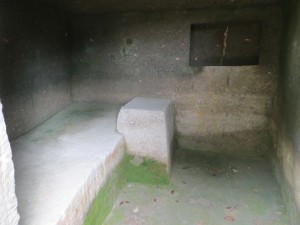
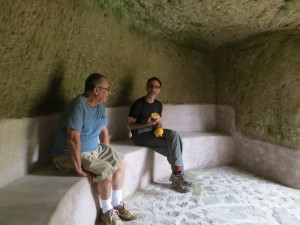
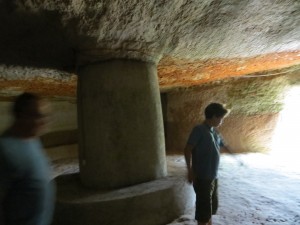
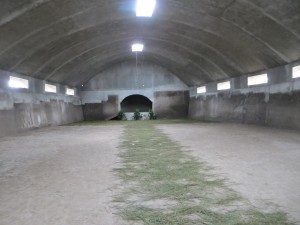
There’s even a round table, constructed of rock, built into the ground overlooking the pond.
In the course of our tour, Don Manuel shared oranges with us, then loaded us up with an armload to take on the road. He also recommended a tire store in town when I asked about it, and reassured us that the road to Perquín is rough, but not nearly as difficult as the one from La Esperanza. We thanked him and hit the road, stopped in town for a new (used) tire in excellent condition and reasonably priced, got some food for the road, got more directions from locals, and headed off back into the mountains.
Don Manuel was right. We were still on a dirt mountain road, but it was a definite improvement over the previous day. And through more beautiful country. After an hour or so, we arrived at the easiest border crossing to date. Everybody on both sides was friendly and helpful. We didn’t spend any money crossing, and didn’t have to fill out any forms promising dire consequences if we tried to leave without the van. Piece of cake.
We continued down the road, arrived in Perquín in mid-afternoon, and found a very pleasant hotel, where I’m sitting as I type these words. I’m watching the sun set, and getting ready to gather up the family and get some dinner.


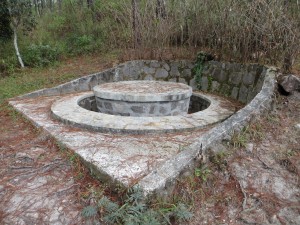

I’ve read this twice, it’s so interesting and evocative. Mine is a tedious question: what is his source of income that he can run the hotel for free, excavate massive underground structures, etc.?
I wondered that myself, but never found the opportunity to ask. He bought the land in the 70s, when he must have been in his 30s, and successful already. One wonders…
The hotel isn’t free, just very reasonable, and therefore not sufficiently profitable to pay for all the other stuff. He offers day use of the grounds for free to religious groups, but charges for overnight accommodations.
Would people be able to actually stay in any of the caves? You’ve run into the most amazing places to spend the night(s). Why the interest in Perquin other than it being an FLMN stronghold?
I believe that’s the intent, though he didn’t mention that anyone had done so. And even though it’s the dry season, all of the caves seemed rather damp (thanks, climate change).
Three reasons for Perquín: the FMLN museum, the lovely setting in the mountains and a really nice hotel.
Henry and Elizabeth, I am so enjoying reading about your travels – thank you for the time you are taking to write and share. Margaret
That sounds so lovely! And I can tell you have fallen into the rhythm of seasoned travelers by now.
Yup, add a little tarragon, turn us over and put us back in for another six weeks.